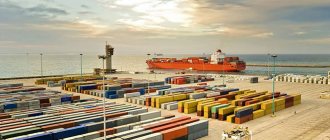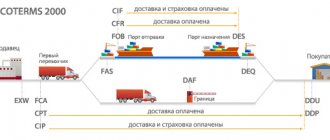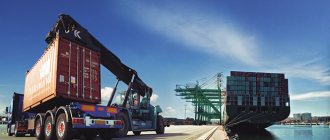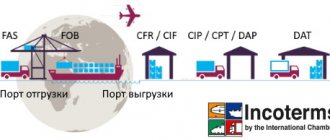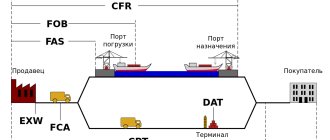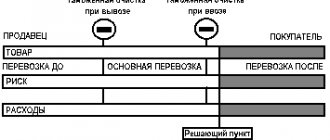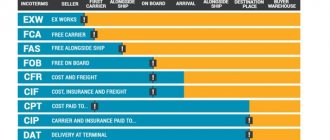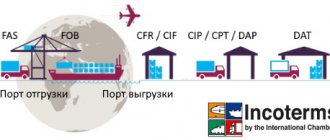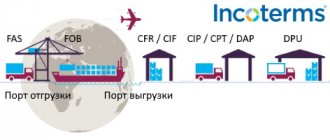Successful sales imply well-coordinated interaction between the seller and the buyer, and their strict adherence to all responsibilities. In this case, the deal will be beneficial for both parties. To regulate the relationship between buyer and seller, special trading rules INCOTERMS 2010 were created. They are generally accepted and quoted in many countries. When using water transportation of cargo within the framework of these rules, the term FOB is used. What does this term mean? What are the delivery conditions, rules and responsibilities for all parties to the transaction? It is worth answering these questions in detail.
What does FOB delivery mean, what does it mean?
Delivery terms FOB Incoterms 2010 - decoding “Free On Board” named port of shipment is translated “Free on board” the specified port of shipment means that the seller made delivery when the goods moved on board the vessel at the specified port of shipment. The term FOB
can only be used when transporting goods by sea or inland waterways.
The new delivery terms FOB Incoterms 2021 came into force on January 1, 2021.
Responsibilities for FOB Basic Delivery Terms
Delivery basis FOB Incoterms 2010
imposes on the seller the obligation to carry out export customs procedures for the export of goods with payment of export duties and other fees in the country of departure, but the seller is not obliged to complete customs formalities for the import of goods, pay import customs duties or perform other import customs procedures upon import.
The buyer is obliged to pay for the freight of the vessel, unload it at the port of arrival, perform import customs clearance with payment of import customs duties and taxes, and deliver the goods to the destination. If the parties intend to assign the buyer the responsibility for loading the goods on board the vessel, it is advisable to use the FAS Incoterms 2010 rule.
FOB delivery terms are relevant for goods transported in bulk or in containers. When placing goods in a container, it is typical for the seller to hand over the goods to the carrier at the terminal rather than by placing them on board the vessel, in such cases the term FCA Incoterms 2010 should be used.
FOB Advantages
For the seller:
- No need to charter a ship. The goods are under the control of the buyer for the main part of the journey, so the seller does not worry about all the problems associated with transportation.
- There is no need to have a representative office in the destination country, etc. All further operations on customs clearance, import clearance and resolution of legal issues are on the receiving side.
- It is easier to solve problems with shipping, since the bill of lading (or other accompanying documents) indicates the seller as the sender.
For the buyer:
- From the moment of loading onto the ship, the receiving party controls its goods.
- The buyer can choose any carriers that suit him in terms of terms and delivery times, as well as cost.
FOB price, payment terms and transfer of ownership
FOB price means that the contract (invoice or customs) price for a product includes the sum of the cost of the product itself, export customs clearance of this product with payment of export duties and other fees, as well as the cost of delivery to the port of shipment and loading of cargo at on board the ship without the cost of transportation (freight) to the port of destination.
Delivery terms FOB Incoterms
do not indicate the price for the goods and the method of payment, do not regulate the transfer of ownership of the goods or the consequences of violation of the contract. The price and transfer of ownership must be determined in the terms of the purchase and sale agreement. The FOB trade term indicates which party to the sales contract must carry out the necessary actions for transportation and customs clearance, when and where the seller transfers the goods to the buyer, as well as what costs each party bears.
Differences between FOB and CIF delivery terms
The difference between FOB and CIF delivery terms is the obligation to transport the goods by ship to the port of destination and insurance. In simple words, according to FOB delivery terms : the goods, at the expense of the seller, having passed export customs clearance, are transported to the port of shipment and loaded on board the ship chartered by the buyer. According to the delivery basis of CIF Incoterms 2010: the goods, at the expense of the seller, having undergone export customs clearance, are transported to the port of destination , and must also be insured in favor of the buyer against the risk of loss and damage to the goods during transportation to the port of unloading. The differences between the FOB delivery terms and other terms are presented in the table of differences in Incoterms 2010.
RESPONSIBILITY OF THE BUYER AND SELLER ACCORDING TO INCOTERMS 2010
The table shows the distribution of responsibilities and costs between buyers and suppliers according to the selected Incoterm (source: Incoterms 2010).
| Incoterm type | Cargo transportation | Risks | Expenses |
| EXW | Shipping will be arranged by the buyer | Transfer of risks from the seller to the buyer when the goods are in the buyer's possession | The transfer of value from the seller to the buyer when the goods are in the buyer's possession |
| FCA | Transportation is carried out by the buyer or seller on behalf of the buyer | Transfer of risk from the seller to the buyer when the goods are delivered to the carrier at the named place | Transfer of costs from the seller to the buyer when the goods are delivered to the carrier at the named place |
| CPT | Transportation must be arranged by the seller | Transfer of risks from the seller to the buyer when the goods are delivered to the carrier | Transfer of expenses at the port of destination, the buyer pays such expenses that are not included in the seller’s account under the contract of carriage |
| C.I.P. | Shipping and insurance will be arranged by the seller | Transfer of risks from the seller to the buyer when the goods are delivered to the carrier | Transfer of expenses at the port of destination, the buyer pays such expenses that are not included in the seller’s account under the contract of carriage |
| DAT | Transportation must be arranged by the seller | Transfer of risks from the seller to the buyer upon delivery and unloading of goods at the terminal | Transfer of costs from the seller to the buyer upon delivery and unloading of goods at the terminal |
| DAP | Transportation must be arranged by the seller | Transfer of risks from the seller to the buyer upon delivery of the goods to the specified location ready for unloading | Transfer of costs from the seller to the buyer when the goods are delivered to a designated location ready for unloading |
| DDP | Transportation must be arranged by the seller | Transfer of risks from the seller to the buyer when the goods are placed at the disposal of the buyer | Transfer of costs from the seller to the buyer when the goods are placed at the buyer's disposal |
| F.A.S. | Transportation must be arranged by the seller | Transfer of risks from the seller to the buyer when the goods have been placed next to the vessel | Transfer of costs from the seller to the buyer when the goods have been placed next to the vessel |
| FOB | Transportation must be arranged by the seller | Transfer of risks from the seller to the buyer when the goods pass the ship's rail | Transfer of costs from the seller to the buyer when the goods pass the ship's rail |
| CFR | Transportation must be arranged by the seller | Transfer of risk from seller to buyer when goods pass the ship's rail | Transfer of expenses at the port of destination, the buyer pays such expenses that are not included in the seller’s account under the contract of carriage |
| CIF | Shipping and insurance must be arranged by the seller | Transfer of risk from seller to buyer when goods pass the ship's rail | Transfer of expenses at the port of destination, the buyer pays such expenses that are not included in the seller’s account under the contract of carriage |
The relevance of using the FOB basis
Today, the FOB Incoterms delivery terms as amended in 2010 are considered obsolete, because On January 1, 2021, the new rules of Incoterms 2021 came into force. However, the International Chamber of Commerce only recommends, but does not oblige, the use of FOB Incoterms 2021 delivery terms, therefore, in supply contracts you can refer to the FOB Incoterms 2010 delivery basis.
>
Responsibilities of the seller under FOB terms | Buyer's responsibilities under FOB terms |
| A.1. DELIVERY OF GOODS IN ACCORDANCE WITH THE AGREEMENT The Seller is obliged, in accordance with the purchase agreement, to provide the buyer with the goods, a commercial invoice or equivalent electronic communication, and any other evidence of compliance that may be required under the terms of the purchase agreement. | B.1. PAYMENT OF THE PRICE The buyer is obliged to pay the price of the goods stipulated in the purchase and sale agreement. |
| A.2. LICENSES, CERTIFICATES AND FORMALITIES The seller must, at his own expense and risk, obtain any export license or other official certificate and, if required, complete all customs formalities necessary for the export of the goods. | B.2. LICENSES, CERTIFICATES AND FORMALITIES The Buyer must, at his own expense and risk, obtain any import license or other official certificate and, if required, complete all customs formalities necessary for the import of the goods and, if necessary, for their transit. through third countries. |
| A.3. CONTRACTS OF CARRIAGE AND INSURANCE a) Contract of carriage - no obligations. b) Insurance contract - no obligations. | B.3. CONTRACTS OF CARRIAGE AND INSURANCE a) Contract of carriage. The buyer is obliged, at his own expense, to enter into a contract for the carriage of goods from the named port of shipment. b) Insurance contract - no obligations. |
| A.4. DELIVERY OF GOODS The seller must load the goods on board the vessel nominated by the buyer on or within the agreed date at the named port of shipment in accordance with the customs of the port. | B.4. ACCEPTANCE OF DELIVERY The Buyer is obliged to accept delivery of the goods when it is made in accordance with Article A.4. |
| A.5. TRANSFER OF RISK The Seller is obliged subject to the provisions of Article B.5. bear all risks of loss or damage to the goods until the goods pass the ship's rail at the named port of shipment. | B.5. PASSION OF RISK The Buyer must bear all risks of loss of or damage to the goods from the time the goods pass the ship's rail at the named port of shipment, and from the agreed date or expiration of the agreed period for delivery, which arises or arises from his failure to give notice in accordance with Article B. 7., or in the event that the ship appointed by him failed to arrive on time, or was unable to accept the goods on time or stopped accepting the cargo before the deadline established in accordance with Article B.7. time. The condition, however, is that the goods comply properly with the contract. This means that the goods must be properly identified, that is, clearly separated or otherwise identified as the goods that are the subject of the contract. |
| A.6. ALLOCATION OF COSTS The seller is obliged, subject to the provisions of Article B.6.: to bear all costs associated with the goods until the goods pass the ship's rail at the nominated port of shipment in accordance with Article A.4. and pay, if required, all costs associated with the completion of customs formalities for export, as well as other duties, taxes and other charges payable upon export of the goods. | B.6. ALLOCATION OF COSTS The buyer must bear all costs associated with the goods from the time the goods pass the ship's rail at the named port of shipment and bear all additional costs incurred either because his nominated ship fails to arrive on time or is unable to take delivery of the goods. on time, or stopped accepting the cargo before the deadline established in accordance with Article B.7. date, or due to his failure to comply with his obligation to give due notice in accordance with Article B.7. The condition, however, is that the goods comply properly with the contract. This means that the goods must be properly identified, that is, clearly separated or otherwise identified as the goods that are the subject of this contract, and pay, if required, all duties, taxes and other charges, as well as the costs of completing customs formalities, payable upon import of goods, and, if necessary, for their transit through third countries. |
| A.7. NOTICE TO THE BUYER The seller must give the buyer sufficient notice that the goods have been delivered in accordance with Article A.4. | B.7. NOTICE TO SELLER The Buyer shall give the Seller sufficient notice of the name of the vessel, place of loading and time of shipment. |
| A.8. PROOF OF DELIVERY, TRANSPORT DOCUMENTS OR EQUIVALENT ELECTRONIC COMMUNICATIONS The Seller must provide the buyer at his expense with the usual transport documents in accordance with Article A.4 as proof of delivery of the goods. In the event that such evidence referred to above is not a transport document, the seller is obliged to provide the buyer, at his request, expense and risk, with all possible assistance in obtaining a transport document for the conclusion of the contract of carriage (for example, a negotiable bill of lading, a non-negotiable sea waybill, proof of transportation by inland water transport, or multimodal transport bill of lading). In the event that the seller and buyer have agreed to use electronic communications, the documents mentioned above may be replaced by equivalent electronic messages (EDI). | B.8. PROOF OF DELIVERY, TRANSPORT DOCUMENTS OR EQUIVALENT ELECTRONIC MESSAGES The Buyer must accept proof of delivery in accordance with Article A.8. |
| A.9. INSPECTION - PACKAGING - LABELING The seller must bear the costs associated with the inspection of the goods (e.g. quality, size, weight, quantity) necessary to deliver the goods in accordance with Article A.4. The seller is obliged to pay at his own expense the costs associated with packaging necessary for the carriage of the goods (except in cases where it is customary in this branch of trade to send the goods stipulated by the contract without packaging). The latter is carried out to the extent that the circumstances relating to transportation (for example, methods of transportation, destination) were known to the seller before concluding the sales contract. The packaging must be properly labeled. | B.9. GOODS INSPECTION The Buyer shall bear the costs of any pre-shipment inspection of the goods unless such inspection is required by the authorities of the country of export. |
| A.10. OTHER OBLIGATIONS The Seller is obliged, at the request of the Buyer, to provide the latter, at his expense and risk, with full assistance in obtaining any documents or equivalent electronic messages (other than those mentioned in Article A.8.) issued or used in the country of dispatch and/or in the country of origin goods that the buyer may need to import the goods or, if necessary, for their transit through third countries. The seller is obliged to provide the buyer, upon his request, with all the information necessary for the implementation of insurance. | B.10. OTHER OBLIGATIONS The Buyer must bear all costs and fees associated with the receipt of documents or equivalent electronic communications as provided in Article A.10., and also reimburse the Seller for expenses incurred by the latter as a result of its assistance to the Buyer |
E-INCOTERMS 2010
EXEMPT FROM FACTORY (EXW)
If the purchase contract specifies ex-factory conditions, the seller must deliver the goods to the location (own or third-party warehouse) and the buyer must arrange collection and transportation to the final destination, bearing all risks and costs of logistics operations after delivery.
EXW is beneficial to the seller and less beneficial to the buyer, since the buyer assumes the burden and associated risks of delivering the goods to the final destination - and the seller is released from any liability once the goods are delivered to the buyer.
Once the item is manufactured and packaged, the seller sends a “Notice of Readiness” to the buyer. Upon receipt of such notice, the buyer must plan, organize and perform any subsequent logistics activities to deliver the goods to the destination (for example, loading on a truck or rail, transporting goods by road, rail, sea or air, clearing goods for export and import, storing goods at any intermediate point, unload goods upon arrival, etc.).
The seller can, of course, assist the buyer in loading operations, however, if the goods are damaged during these activities, the buyer, not the seller, bears any financial responsibility.
The buyer accepts EXW only when he is confident that he can manage all the activities of moving goods from the exporting country to the importing country, including the customs clearance activities for export and import (which may not be easy in some countries).
Indeed, even if the seller has a general obligation to support the buyer in such actions, the buyer has primary responsibility under this Agreement. If the buyer and seller are in the same country, then accepting EXW shipping is less risky and hassle.
DIFFERENCE BETWEEN EXW AND FOB
The term FOB is a variation of the plant agreement used for deliveries that occur at a specific point of origin rather than at the seller's premises. Under this condition, the seller bears the costs and risks associated with transferring the goods to the transport terminal and clearing the goods for export to make them readily available on board the vessel.
However, with FOB delivery, the buyer is responsible for arranging and paying for the shipment of the goods from origin to destination and for clearing the goods upon import. Under FOB, the buyer is also responsible for arranging and paying insurance costs for the goods.

